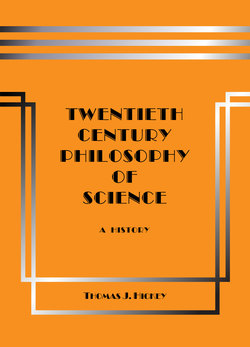Читать книгу Twentieth-Century Philosophy of Science: A History (Third Edition) - Thomas J. Hickey - Страница 74
На сайте Литреса книга снята с продажи.
3.43 Pragmatic Definition of Theory Language
ОглавлениеScientific theories are universally quantified statements including mathematical expressions (a.k.a. “models”) that are proposed for empirical testing.
Unlike positivists and romantics, pragmatists define theory language pragmatically, i.e., by its function in research, instead of syntactically as an axiomatic system or semantically by some distinctive content. This functionality supplies the definition of “theory” in the contemporary pragmatist philosophy of science. It contains the traditional idea that theories are hypotheses, but the reason for their hypothetical status is not due to either the positivist observation-theory dichotomy or the romantics’ requirement of referencing subjective mental states. Theory language is hypothetical because interested scientists agree that in the event of falsification, it is the theory language that is falsified instead of the test-design language. Often theories are deemed to be more hypothetical, because their semantics is more empirically underdetermined.
Theory is a special function of language – empirical testing – rather than a special type of language.
Scientists believe that the proposed theory statements are more likely to be productively revised than the presumed test-design statements, if a falsifying test outcome shows that revision is needed.
Pragmatically after a theory is tested, it ceases to be a theory, because it is either scientific law or rejected language, except for the skeptical scientist who wants further predictive testing. Designing empirical tests can tax the ingenuity of the most brilliant scientist, and theories may have lives lasting many years due to difficult problems formulating or implementing decisive test designs. Or as in a computerized discovery system with an empirical decision procedure, theories may have lives measured in milliseconds.
After a conclusive test outcome, the tested theory is no longer a theory, because the conclusive test makes the theory either a scientific law or falsified discourse.
Romantic social scientists adamantly distinguish theory from “models”. Many alternative supplemental speculations about motives, which they call “theory”, can be appended to a model that is has been tested. But it is the model that is empirically tested statistically or predictively. Pragmatically the language that is proposed for empirical testing is theory, such that when a model is proposed for testing, the model has the status of theory.
Some time after initial testing and acceptance, a scientific law may revert to theory status to be tested again. Centuries after Newton’s law of gravitation had initially been accepted as scientific law, it was tested in 1919 in the famous Eddington eclipse test of Einstein’s alternative general relativity theory. Thus for a brief time early in the twentieth century Newton’s theory was pragmatically speaking actually a theory again.
Thus the term “theory” is ambiguous; archival and pragmatic meanings can be distinguished. In the archival sense philosophers and scientists still may speak of Newton’s “theory” of gravitation, as is often done herein. The archival meaning is what in his Patterns of Discovery Hanson calls “completed science” or “catalogue science” as opposed to “research science”. The archival sense has long-standing usage and will be in circulation for a long time to come.
But research scientists seeking to advance their science using theory in the archival sense are seeking an El Dorado. The archival sense is not the meaning that is needed to understand the research practices and historical progress of basic science. That is why philosophers today recognize the pragmatic meaning of “theory”, which is a transitional phase for a science. In the pragmatic sense Newton’s “theory” is now falsified physics in basic science and is no longer proposed for testing, although it is still used by aerospace engineers and others who can exploit its lesser realism, i.e., lesser truth.
